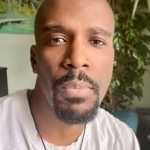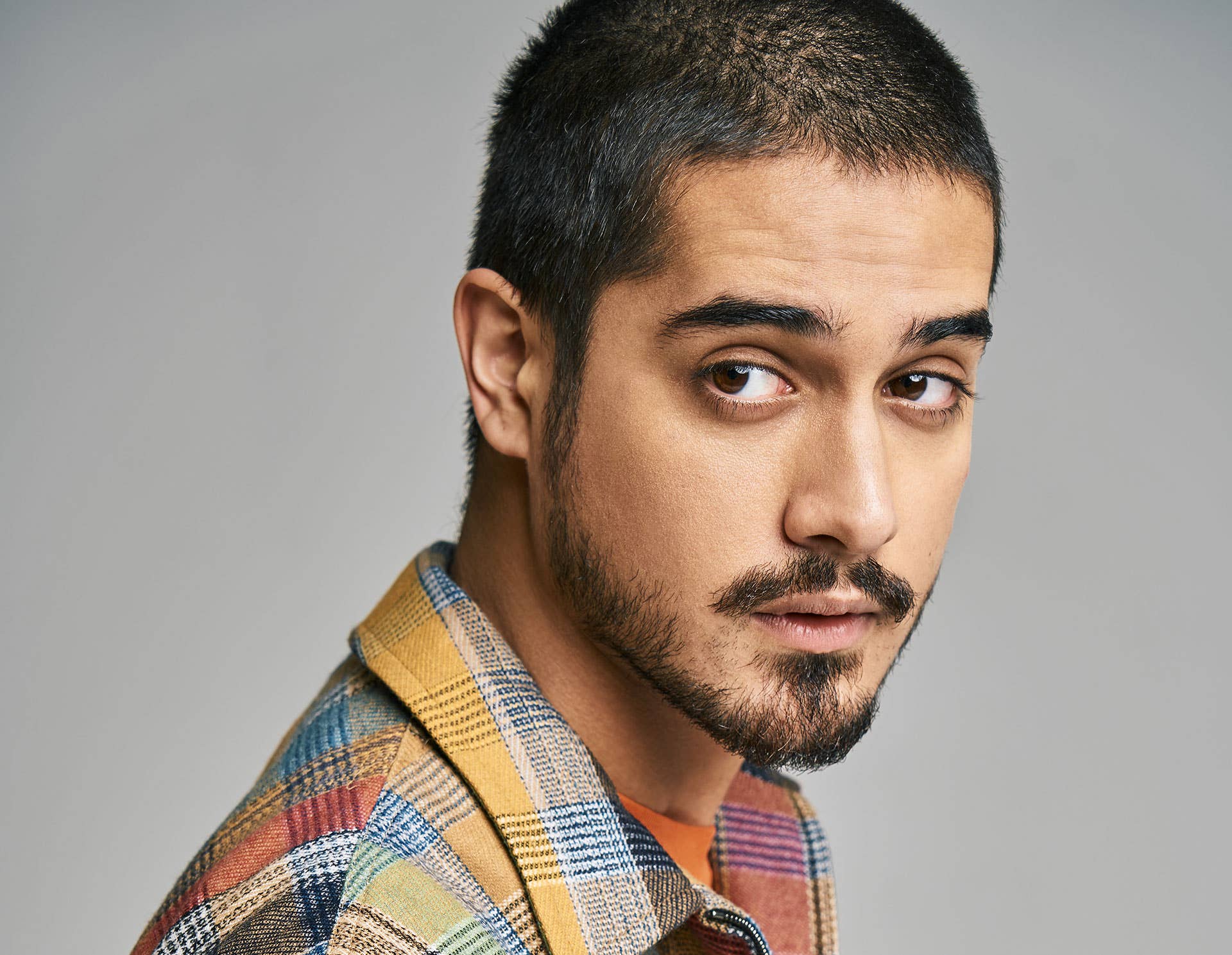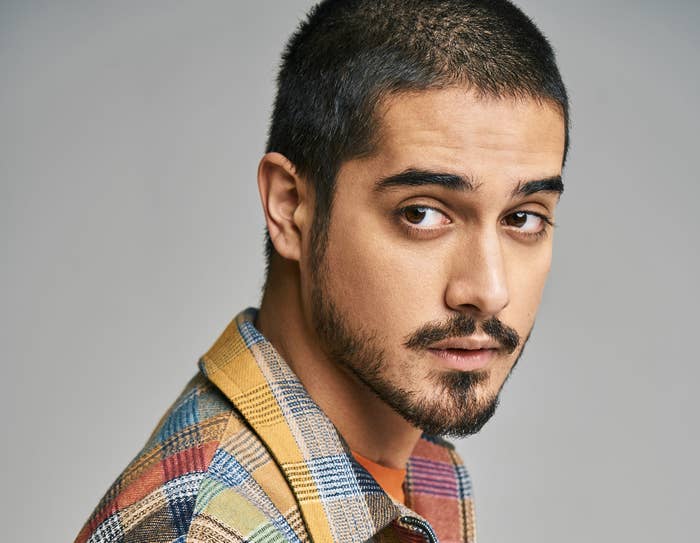
Avan Jogia speaks like a man with range. Over the last few decades, the 29-year-old actor, writer, and newly minted director has appeared on TV as a shaggy-haired, much thirsted-after heartthrob (Nickelodeon’s tween sitcom Victorious), a cool-tempered 14th-century king (Spike TV’s Tut), and a sexually fluid actor turned stoner (Starz’s Now Apocalypse), among other parts.
But what seems to unify these dissimilar roles, as Jogia makes sure to mention, comes from the career brand being “boring as hell as a concept.” As a matter of choice, he isn’t one to be pigeonholed. This also becomes obvious within moments of speaking with him. In one breath, he might muse about Muppet Treasure Island as being his thespian inspiration—but then follow through by outlining an Al Pacino-led performance in The Panic in Needle Park (1971). He embraces every side, even if he’ll likely be remembered best for acting next to Ariana Grande in the 2010s as a matter of reference.
“Victorious was sort of a thing that happened, and a thing I don’t really think I expected to happen,” says Jogia before later adding an asterisk to the role. “The idea that I would look down, or that anyone would put their nose down over an experience like that is foolish.”
The Vancouver-born actor has never been turned off by this, as some famous former child actors might be—the obsessive, everlasting renown from a role he once took on, one that former tweens may never forget, and that some may forever associate him with. He’s too tranquil of an artist for that and far too grateful.
Given Jogia’s liquid career approach, it was likely destined that he’d end up starring in a movie based on a multi-million-dollar video-game franchise, Resident Evil: Welcome to Raccoon Cityas Leon Kennedy (in theatres this Wednesday)—and as a man behind the camera with his directorial debut in Door Mouse.
Clearly, Jogia is having fun. I caught up with the Canadian artist to chat about gratitude, Resident Evil, Hollywood, and what he’s still attempting to discover about himself.
You get this opportunity to star in a Resident Evil movie as the goat, Leon Kennedy. What were your initial thoughts?
He’s a childhood video game hero of mine. I played a ton of hours of Resident Evil 4 as a kid, and honestly, pretty recently I’ve been playing the VR version which has been super cool. But I think being able to put on the shoes and gloves of a character who everyone loves and knows so well is always an interesting place to start. Because you’re also dealing with, not just your own interpretation of a character as it is on the page, but also a public idea of who this person is.
Elaborate on that. Because I have to wonder how you approached acting as a video game character where you have a core gaming audience anal about a particular look or attitude.
It’s funny because when he was first written in some of the earlier video games, he’s grizzled, he’s a cop, and he’s got that action hero stuff going on with his lines. There’s not a lot of character development there. By the time the fourth entry comes around, you really start to see who he is. He’s got this sense of humour. He’s also frustrated around the fact that he has to protect a president’s daughter. That’s his tone, which I thought was interesting. But I’ll also say that he’s a lot of different things to a lot of different people, and in that way, it’s special to be a part of that.
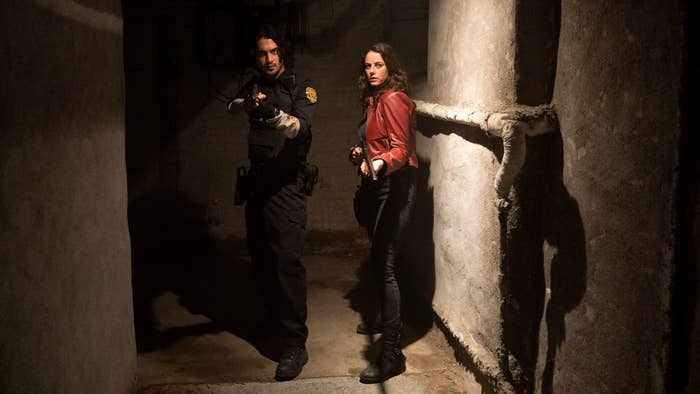
I gotta say, based on the comments you’ve made and the interviews you’ve done, you’re in a really great place right now. There’s a graciousness for being able to act for a living. Has that been a consistent feeling for you?
I’ve always been able to maintain a healthy balance between gracious and unsatisfied while making sure that one feeling doesn’t override, or get too large over another. It’s possible to be too gracious, think life is good, and no longer believe that you need to do anything, which is valid. But I’ve always had this itch around something that I’m trying to pursue from an artistic standpoint. I don’t always know what that medium is either. Sometimes it’s writing, directing, and sometimes it’s painting. It takes a certain level of dissatisfaction to get motivated in that way. But on the other end, you can’t just be dissatisfied right? That’s just a miserable existence. So, over the last two years, I’ve been trying to concentrate on what my actual day-to-day out existence is, and if I’m getting a steady stream of joy. I’m also doing the hard job of navigating away from the hard things that aren’t bringing me joy.
Have you discovered that day in day out in a way you can describe?
Yeah, it comes down to fighting for my own time. It’s fighting for the slice of my 12 hours of daylight. It’s not like anyone is making me do any of this. I’m choosing to do this but in that same breath, we live in a world that demands that your time on this earth results in some sort of something that contributes a certain amount. I’m just trying to kick it on a beach a little bit more, or not on a beach at all. That’s been very hard honestly because I haven’t really been that successful yet, but I’m working on it.
“I didn’t get into this gig to become a slightly more charming version of myself so I could lean up against a wall and say a slick line.”
When we talk about gratitude, how does that affect the roles you choose? Because they’ve been big, small, and everywhere. When it comes to branding, is that intentional?
I don’t think I’ve ever wanted to be one of those actors that brings a specific thing. I do want to have a brand, with that brand being that I’ll do whatever it takes to communicate a particular part. And that role might be as far away from who I humanly am. I didn’t get into this gig to become a slightly more charming version of myself so I could lean up against a wall and say a slick line. A lot of what the film industry asks you to be is an idea of a movie star, where you’re a person or personality that they’ve animated and put into these different movie scenarios. It’s like, Avan Jogia the spy, or romantic lead, which seems like a boring as hell as a concept to me.
Also, honestly man, it comes from being in an industry where a lot of that wasn’t really accessible to me eight or nine years ago. A lot has changed, but what it used to be set me on a path of making good characters and being good at whatever I do. I’m not going to try to pursue this particular brand of movie star that they really seem to like to create.
I actually remember reading about how much you didn’t care about public opinion when it comes to your brand. That’s not normal for actors, where work can be dictated by public opinion. Where does that confidence come from?
I think it’s something that’s developed since I don’t think it’s how I’ve always felt. Being so close to the sun when I was on Nickelodeon, and doing the teen heartthrob thing, I was close enough to realize that I didn’t really care. It’s not that it’s completely vain or without purpose, it’s just not good enough. It’s not a full enough meal for me. I got to eat and as an artist, when your compass starts to become about yourself and what you need, you start to realize that a lot of it doesn’t matter. A lot of it is just bullshitting around opinions over what you should be doing.
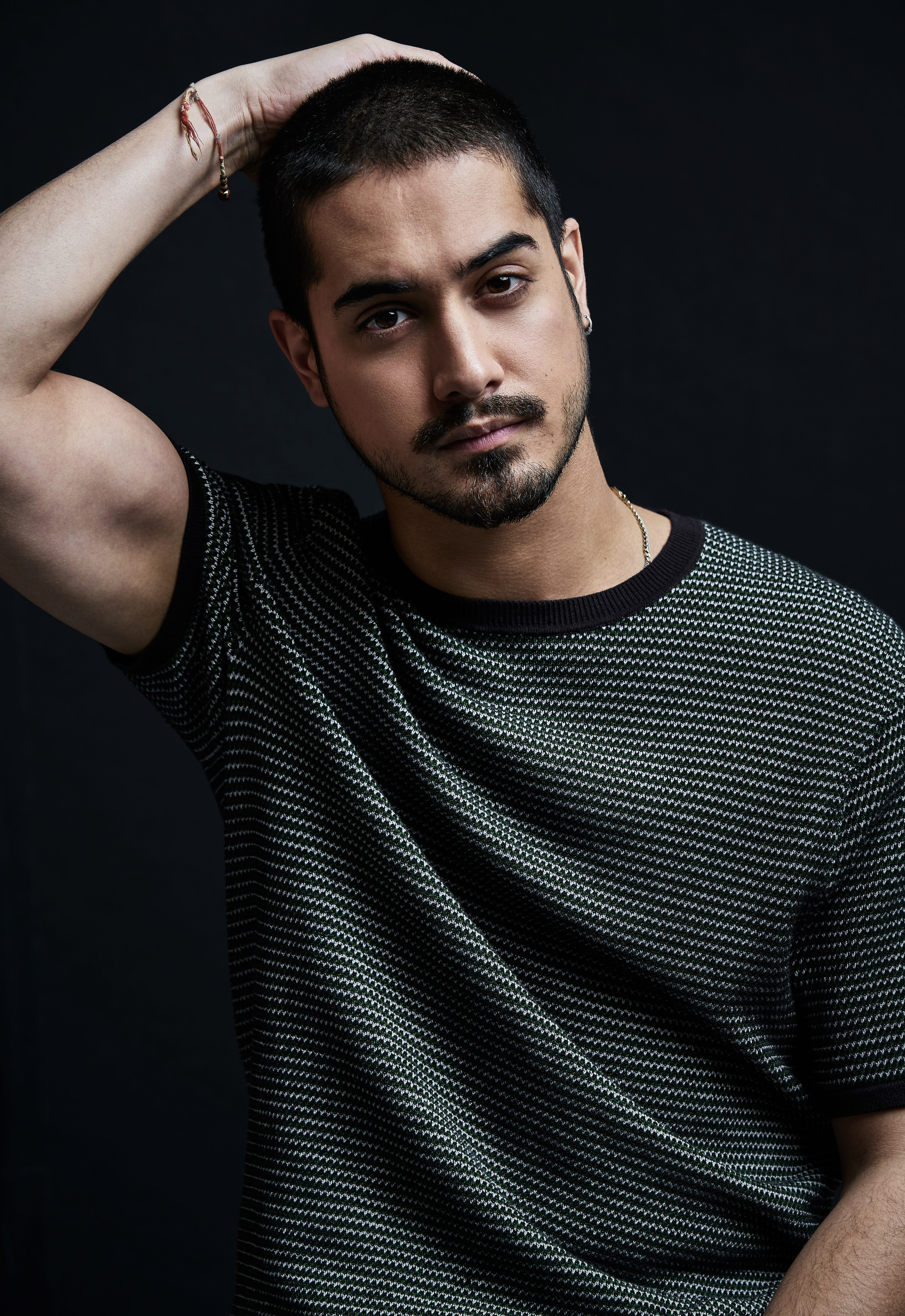
I wonder. When you come from a one-in-a-lifetime success like Victorious, acting alongside Victoria Justice or Ariana Grande, is that something you try to break from as a growing artist, or an experience you embrace?
Going back to that gratitude conversation we were having. I’m definitely gracious for my time on a show that’s so beloved. It had such an impact on my own life even if it interacts really minimally. It doesn’t fuel my artistic choices. It never did. I was basically doing all the same shit I was doing when I was on the show, but now I’m doing it publicly. I’m releasing books, albums, and directing movies, which is just a larger version of my normal habits. Victorious was sort of a thing that happened, and a thing I don’t think I really expected to happen. I think it’s a cliche for the actor who considers themselves an artist to break away from the thing that they’re known for. It’s such a boring cliche to me. But the idea that I would look down, or that anyone would put their nose down over an experience like that is foolish. It’s what children do when they feel inadequate.
“When you try to go outside of that box, it’s difficult. The system in place doesn’t really want artists of colour to pursue stories that are outside of what the system wants.”
Is acting what you imagined it to be? I know Muppets Treasure Island is an inspiration of yours. I’m honestly not sure if you were being serious with that one.
[Laughs] Oh man, I love that movie. It’s a great movie. But this is the duality of my experience on this earth and it’s what people are getting more comfortable with. That’s my shit. I love Muppet Treasure Island. But I also love The Panic in Needle Park. I love seeing the great performances of the 1960s and ’70s that got me into the game in a serious way.
I think the truth is that I bought into a version of the industry that was out of the way, the idea of the indie film with great performances in it, especially with young people being able to act in those parts. We weren’t really doing that. So, in a way, it’s what I expected it to be. But at the same time, it’s what I wanted it to be because I choose parts where I can do something completely different and not be myself. So often, you’re asked not to do that. That’s sort of been a bit of a disheartening thing about getting into this industry and seeing how it’s actually developed. But it’s also exciting because there are always options.
You’ve also wrapped up production on your directorial debut in Doormouse. Congratulations. What was that experience like?
It’s amazing. I did have that moment of saying, yeah, this is good, this is really creatively fulfilling. Maybe those questions I’ve been asking and trying to pursue through acting are being answered in a directorial position. I wrote the script six years ago and it’s been a labor of love trying to get it made. When I first wrote it, it covered topics that people are now interested in having conversations about, such as hard questions of the rich, systems of oppression and it covers Black and brown bodies. It’s all of these topics that no one thought was appropriate. I got a ton out of that as a director and being able to create a world like that.
You’ve been holding onto directing it for a while, huh?
Yeah, and the thing is I know how this industry works. If I wanted to make a film about my identity, make it about me where I’m this mixed brown kid who wants to be an actor, but my parents don’t want me to be an actor, so on and so forth. I can get that movie made a lot easier, but I wouldn’t. I don’t want to watch that kind of movie. What I realized in the industry is that even with this revolutionary shift that’s going on, you really only represent yourself and that’s your value to the system as an artist.
I was frustrated with that because I wanted to make a movie that had nothing to do with my identity. It has a lot to do with my background, and it covers the exploitation of the poor, but it’s really not about me. They don’t look like me or talk like me. It’s hard to make a movie like that because they see your race and your bag of identities as the boxes you check towards the reason why a film can be made. When you try to go outside of that box, it’s difficult. The system in place doesn’t really want artists of colour to pursue stories that are outside of what the system wants.
To that point, you wrote a book called Mixed Feelings about identity, race, and religion, partly based on your experiences. We’ve gone through some apparent reckonings over the past few years, and I wonder how you see Hollywood’s own engagement with that conversation.
Honestly, my faith is not really in the system of Hollywood because that doesn’t make sense to me. I put my faith in people. Every 10 years, there’s this big push at the gates it seems, in all industries, but especially my own, to change the landscape. In one era, you’ll see five or six filmmakers of colour get in, and we’re all surprised. It must mean they’re going to change the world. Then they’ll try to navigate the system that allows them to keep making films and then their interest is forced into a place of self-preservation, as it should be, because of how amazing it is that they got through the door. But this last wave of people are not only trying to push the doors down for themselves but they’re also interested in holding the doors open to get more people through. That’s the change I’ve been impressed with over Hollywood’s reaction because it’s always the same with them.
It’s interesting because, in a way, you’ve been lucky enough to rarely have to play characters tied to that conversation. For example, I’ve seen comments about Leon being Italian or Asian. What are your thoughts on your own position around not having to take on specific roles based on ethnicity?
I don’t think you can operate without acknowledging that there’s a privilege in navigating these spaces while being labeled by the system as ambiguous ethnic. I come from a long line of ambiguously ethnic actors that snuck through the industry. It’s like, you’ll have someone say, did you know Keanu Reeves is Chinese? A lot of actors come from that. For me, I didn’t grow up with any positive brown stereotypes in my childhood. No one I saw on television really represented me. But because I was ambiguously ethnic, all sorts of brown kids saw themselves in me on Victorious. That’s another thing that keeps me gracious about the show. It’s in how many brown, Mexican, and Muslim kids felt accepted in some way.
I saw a Buzzfeed video where you talk about thirst tweets, so I gotta ask. What are your feelings about being a sex icon of sorts?
[Laughs] I’ll say that it’s all very complimentary, very sweet, and all in good fun. It’s almost like a bit that we do. I connect with fans on some real emotional levels, but also in the same breath, it’s weird. There’s no way to navigate that in a way that seems normal. It’s abnormal. If you want to know the truth of it, I just don’t think about it because it’s too weird to look at objectively. It’ll be someone saying that I’m a part of their sexual DNA. And I’m like wow, great, how am I supposed to react to that? [Laughs] When it first started happening, I was 18 or 19 years old. And sure, it gets into your head a little bit. But right now, for me what holds value comes in the things that I can create, make, and what I can offer to the world from inside my head. It’s my vehicle. My actual vehicle.
